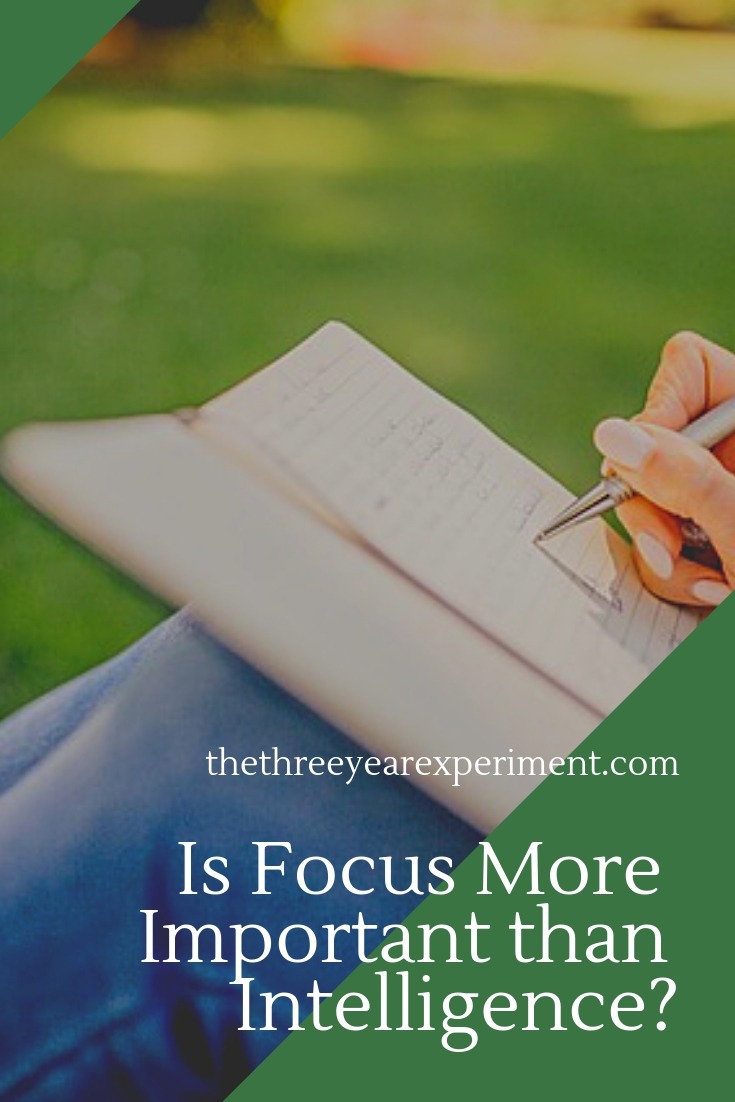Hi guys! We’re waiting for heavy rains and possible power outages with Hurricane Florence. In the meantime, I hope you enjoy this post I wrote last year. Every word is as true (or truer!) today and I definitely need these reminders again, so I’m republishing. Have a good (and safe!) weekend!
I recently stumbled across this quote in an old journal, “Focus is more important than intelligence.” Is focus more important than intelligence? I certainly believe so, and I think the more I live and navigate smart phones and the beginning of the internet revolution, the more I realize that focus is essential to having a good life and making progress towards your goals. I’m sure I wrote it down because it resonated with me, and I felt it in my bones to be true. Also, focus is a struggle, each and every day, for me. I have two jobs, a husband who travels, kids to take to activities and appointments and help with homework, a Masters course, lesson plans, and this blog. It’s a lot of code switching.
Why is focus so necessary nowadays and what can we do to get more?
Cal Newport, author of Deep Work, argues that focus is intelligence. He states that “focus is the new I.Q. in the knowledge economy, and that individuals who cultivate their ability to concentrate without distraction will thrive,” in his bio. His theory is that workers who will be most sought after in our new economy will be those who can quickly master hard things and those who produce at an elite level. Both of these qualities require focus, he argues.
Newport is an author and professor of Computer Science at Georgetown University, and he’s fairly young, young enough to have had social media around in college. But he’s always been very careful where he puts his attention, shunning social media from the start.
“Efforts to deepen your focus will struggle if you don’t simultaneously wean your mind from a dependence on distraction,” he says. For Newport, standing in line at a supermarket is a chance to practice letting our minds wander, rather than checking our social media accounts. The more we wean ourselves from technology and constant distraction, he argues, the better we’ll eventually get at working at a deeper level. Like anything, he argues, it takes practice, and in today’s highly distractible world, it is not a common commodity to have.
No More Social Media?
If you don’t wean yourself from a dependence on your smart phone, or something else that distracts you constantly, then you won’t be able to perform at such elite levels of focus. But how?

Newport is a proponent of digital mimimalism, defined below:
Digital minimalism is a philosophy that helps you question what digital communication tools (and behaviors surrounding these tools) add the most value to your life. It is motivated by the belief that intentionally and aggressively clearing away low-value digital noise, and optimizing your use of the tools that really matter, can significantly improve your life.
To this end, Newport recommends avoiding most forms of social media. In his TED Talk, he explains why. Many of the most popular social media sites, he argues, are engineered to be addictive. Since our attention is a scarce and precious resource, why would we spend it clicking through an app designed to keep us glued to the app, at the expense of a more deeply-fulfilling, real-life experience? That doesn’t mean he eschews all forms of online communication. But his point is that he doesn’t adopt a new technology blindly. He asks himself if the technology in question adds enough value to make it worth it. Will it help him use his time in the best way possible? He has decided that having a blog does. But Twitter and Snapchat do not.
I came across Newport’s TED Talk this summer and after watching, I thought through how to curtail my use of social media, mostly because his arguments against its use resonated. When I think about what I’d most like to focus on, it’s truly not social media. And Facebook can wreak havoc on my contentment levels. I get FOMO almost every time I’m on. Twitter is also a time suck, when my focused time can be scarce.
I’ve also noticed my addiction to my smart phone. I pull it out almost anytime I have a few minutes to wait, and it’s terribly difficult not to pull it out. But there are things I can do at macro and micro levels to help myself focus more.
Macro Level Focus:
“Who Am I” Course
Part of Newport’s recommendations are macro; he recommends figuring out who you really are, what your values are, before making a plan about where to put your attention. For me, that means asking myself questions about how I spend my time.
What’s also been surprisingly helpful is a “Who Am I?” course I’m taking from Tsh Oxenreider called Like Your Life. I bought it last year when it was called The Paddle Upstream Course. I didn’t know how much good it would do me, given that I have a strong idea of who I am, but the writing activities and other exercises the course takes you through are surprisingly instructive in helping you figure out your deepest values and priorities. It’s one of the reasons our family came up with our Three Year Experiment and prioritized travel in our lives, because Mr. ThreeYear and I started talking about what really mattered to us, rather than making it through each day without an ounce of self-reflection, as we’re want to do when we’re overwhelmed or tired.
Goals
The Minimalists recommend asking yourself every day if your actions match your priorities. I think that’s a worthy goal, but unrealistic for me. I’m much more likely to think deeply about my priorities a couple of times a year, and then make sure I’m working towards them. It helps when I make a yearly goal sheet and regularly check it.
This weekend, for example, I’m finally fulfilling a goal from my list, to meet up with a college friend of mine. I tend to put everything before my friendships, so I know that one of the few reasons I made this trip a priority is because it was on the goal sheet.
Sleep and Nutrition
Another important area that throws off focus for all of us at the macro level is sleep and nutrition. If I don’t get enough sleep (which for me is at least 8 hours!) then I walk around in a fog the next day. I am extremely sensitive to sleep deprivation. If I eat poorly, the same thing happens. And if I’m not regularly exercising, I tend to be much less able to focus.

Space for Thinking
I think walks are a fabulous way to get exercise, but they’re also a way very successful people produce at high levels. Creative endeavors, especially, require a certain amount of time where the mind wanders, where you’re not thinking about or doing much of anything. I talk about the importance of making space in your life for thinking in this post, and I’m still convinced it’s one the most important things you can build into your life to improve your focus.
Micro Level Focus:
Plan Your Day
For me, focus is about planning. If I have planned my day and planned what to do during “dead space” in my day–time off–then I will use that time advantageously. If, however, I haven’t planned my day or haven’t made a to-do list, or am tired, then I tend to use that dead space inefficiently–scrolling through Instagram or reading headlines.
One of the ways that works best for me is setting a “tomorrow’s top three“–the top three things I’d like to accomplish that day, set the night before. The only problem is, I don’t do it regularly. And truthfully, at this time of year, there is so much going on with my work and the kids’ homework and school that setting three things might be too much. Sometimes I’ll set one. Currently, my list has “homework for class” written on it (I have to finish my homework for a graduate class I’m taking).
Daily Habits
Focus is also about my habits (I’m a huge fan of habits–check out this page). Over the past few years, I’ve worked on using my smart phone less at home. I’ve been successful in some areas, like in the bedroom. I no longer scroll my phone or iPad before bed. I’ve been somewhat successful in other areas, like smart phone usage when we get home from school. But I still fail in these areas, and I notice it affects my focus. Yesterday, I got sucked into using my computer after school, and followed a rabbit hole of articles and information down the internet. It had nothing to do with anything important, or that I couldn’t have worked on later. Junior ThreeYear finally shocked me out of my spell by asking that I come outside. I used one of Cal Newport’s tips, closed the computer, and told it, “I’m done with you now.” Then I went outside. It’s amazing how much more clearly I could think, how much better I felt, when I went outside.

I’ve filled the commute to school and back this year by listening to podcasts. I never considered doing it before because my commute was short (15 minutes), but I’ve started downloading podcasts to my phone and even those 15 minute chunks, 30 minutes a day, have been fabulous. Hat tip to Mrs. Adventure Rich for inspiring podcast listening with her podcast recommendations. I realize that even listening to podcasts could be a distraction to my biggest priorities, so I make sure that my podcast choices are related to FI or travel.
Truth is, I know this is an area I’ll work through for awhile. I’m leaning more and more toward less social media, less phone scrolling, and less time with my smart phone, and more towards time writing long form posts on the blog, and listening and working on my high priority areas during big chunks of time. I think lots of people are seeing the benefits of cultivating a deeper focus. I know many people are taking breaks from social media. Inspired by Courtney Carver, I’ve recently taken my Gmail application off my phone and stored all my apps in one folder on the second page of my phone, so when I open my phone, it looks like this:

This one small change has decreased my ability to mindlessly scroll, and my tendency to fill my empty moments with media.
So what do you think? Is focus more important than intelligence?



I’d say so. I get a lot more done because I’m able to focus in than from the knowledge and intelligence I bring to the table.
I really enjoyed your post and liked seeing how you broke it down to the macro and micro level.
Thanks for sharing 🙂
Yes, I totally agree, Erik! Thanks for the kind words. I find that as “forest person” it sometimes helps if I explicitly look at things at the forest and tree level, just to make sure I’m not forgetting the important details! 🙂
Missed this the first time but I’m looking forward to checking the links you recommend.
How are conditions by Davidson Lake? Hope y’all are safe. It’s windy here in Wake Forest and we’re under a flash flood warning but nothing horrendous.
Thanks so much, Mrs. Groovy! We ended up getting a few inches of rain and some downed limbs but that was all. How about you guys? I didn’t realize that we’re both living in NC college towns! 🙂
Enjoyed the blog and link to the TED talk. “Treat your attention with respect”. I’ll have to remember that one. Also agree that Twitter is a time suck and that making time to run makes me a better person.
Thanks for sharing! Stay safe
Thanks Kevin. Yep, I have a love/hate relationship with Twitter. It’s necessary but it definitely is a vortex.
It isn’t an either or. Sure focus is very important in success. But intelligence helps too. So does emotional IQ. People who have all three are destined for success.
I agree that all three would be best. But the more I read and learn about attention, the more I realize it’s becoming the new currency advertisers and others are trying to capture. Get someone’s attention in this maxed-out world and you have something powerful. I think we’ll find as time goes on that the most successful people in our society are those who can maintain very high levels of focus on specific goals.